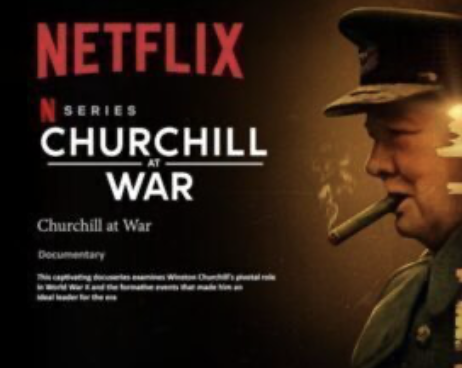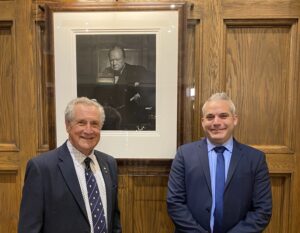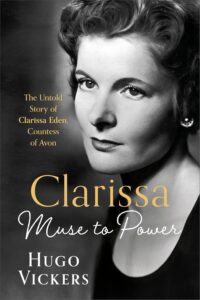Bulletin #200 — Jan 2025
Churchill at War

January 1, 2025
New Documentary from Netflix
Review by ALASTAIR STEWART
If you were to brainstorm a name for a new history documentary, Churchill at War would be the simplest one you could devise. Released in time for Christmas, the Netflix programme is described as a “captivating docuseries [that] examines Winston Churchill’s pivotal role in World War II and the formative events that made him an ideal leader for the era.” So, how does it measure up?
Churchill at War is a unique blend of documentary, docudrama, and AI experimentation, offering a fresh and intriguing approach to historical storytelling. Clearly the filmmakers did not lack compelling subject matter. Whether it be decisions like refusing to make peace with Germany in 1940, the sinking of the French fleet at Oran, accusations that Churchill allowed the Bengal famine to happen in 1943, or delaying the Normandy invasion for as long as possible—you name it—there is no end of debate about his controversial decisions, views, and policies—as well as popular misconceptions about him that attract widespread interest.
With such eclectic, even violent, choices on which to focus, Churchill at War is relatively understated. The analysis is immaculate, and the series is not overtly controversial, except perhaps for including as commentators contemporary politicians like the current U.K. Foreign Secretary David Lammy and former Prime Minister Boris Johnson. Overall, Churchill at War is a compelling introduction to the most significant period in Churchill’s life. It effectively ignites the viewer’s curiosity to delve deeper into his history.

2025 International Churchill Conference
The series is divided into four episodes, the first two with names taken directly from the Churchill canon. “The Gathering Storm” examines Churchill’s early life, military career, and political ascent, culminating in his appointment as Prime Minister during the Second World War. The second episode, “His Finest Hour,” focuses on Churchill’s first months in power, including such critical events as the Dunkirk evacuation and the Battle of Britain. “The Day of Destiny” delves into Churchill’s strategic alliances, particularly with President Franklin D. Roosevelt, and the planning of significant operations like D-Day. Finally, “Out of the Storm” covers the war’s conclusion, Churchill’s role in post-war Europe, and his enduring legacy.
The series attempts to balance modern concerns with Churchill’s judgement and foibles without diluting Churchill’s achievements or power as a titanic figure.
A standout feature of Churchill at War is the use of digitally colourised and archival footage that brings historical events to life with vivid clarity. But it goes further. The series employs AI-generated readings of Churchill’s words, intriguingly using a recreated version of his voice. The overall effect is powerful but also challenging because it blends Churchill’s digital voice with both genuinely historic video and with dramatic reenactments, and the AI voice is not explicitly identified each time it is used.
The effect is marvelous, but the approach has its risks. While this “intelligent” Churchill provides an emotive and novel glimpse into the real man’s thoughts and rhetoric, other less scrupulous people may in future use this powerful technology to promote deepfake nonsense, both hagiographic and iconoclastic, about him and who knows how many other historical figures.
If AI is indeed on the verge of taking ever more powerful leaps forward, as digital experts suggest, the consequences of its expanded use—and potential misuse—are sobering to contemplate. The challenge to what Churchill’s biographer Sir Martin Gilbert called “true history” will become that much greater. (The creators of Churchill at War make no effort to mislead in their use of this technology, but viewers might be confused by what is and is not a computer recreation when these are not clearly marked each and every time.)
The series features interviews with notable figures, including former President George W. Bush and General David H. Petraeus, providing contemporary perspectives on Churchill’s tactics and legacy. There is also an array of historical experts to provide commentary, including many names and faces familiar to those who have attended meetings of the International Churchill Society such as Dan Snow, Andrew Roberts, Catherine Grace Katz, and Allen Packwood, whose expertise stamps a seal of excellence onto the straightforward retelling of Churchill’s wartime leadership.
The series incorporates dramatic reenactments with actor Christian McKay portraying Churchill. (McKay has previously played Christopher Soames in Churchill’s Secret and Franklin Roosevelt last year in the eponymous FDR). This dramatisation is unsurprising, given the involvement of legendary Hollywood producers Ron Howard and Brian Grazer. These scenes aim to humanise Churchill, depicting him in moments of contemplation and decision-making. Even so, some viewers might find the dramatisation of McKay walking along a beach of bodies, staring out across the oceans or burning cityscapes, chomping a cigar, (and looking closer to fifty than Churchill’s sixty-five when he took office) to be a bit repetitive.
McKay plays a good Churchill with gravity, a twinkle in the eyes, and a presence that grows on you, though it would have been helpful if it had been decided to add a bit more padding to his comparatively lithe frame. The twenty-seven-year-old actor Rafe Soule as young Winston is a very good approximation, but his time on-screen is understandably limited.
Especially interesting are the scenes where Churchill’s bouts of self-doubt and reflection are extrapolated. The challenge for the viewer, in these as well in the series’ portrayal of Clementine, is in trying to understand what is extrapolation, what is from letters, what was an actual speech, and what is dramatic license.
Churchill at War is as well-polished as any blockbuster movie, and since each episode is only sixty minutes, the immense story is necessarily fast paced. As in any book, film, or TV series about Churchill, the challenge is balancing the magnitude of his titanic life with the constraints of time. A much longer series about Churchill would of course serve its purpose even better, but unlikely to be cost-effective, even for a giant like Netflix. But since Churchill at War will likely draw a large global audience, hopefully Churchill newcomers will be inspired to explore the Great Man’s life in more detail.
Churchill at War provides an engaging overview of the great man’s wartime leadership, blending innovative technology with historical analysis. While it may not include groundbreaking insights for those deeply familiar with the subject, it is a very accessible introduction for viewers seeking to understand Churchill’s complex legacy. The series achieves the rare feat of offering a new and engaging way of telling an old and familiar story.
Alastair Stewart is chair of ICS Scotland.
Subscribe
WANT MORE?
Get the Churchill Bulletin delivered to your inbox once a month.






